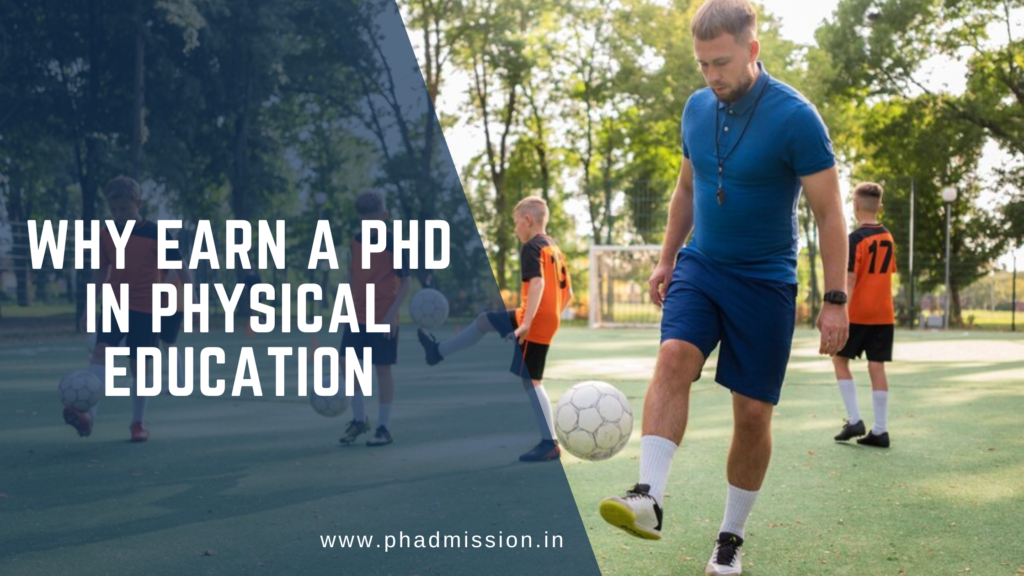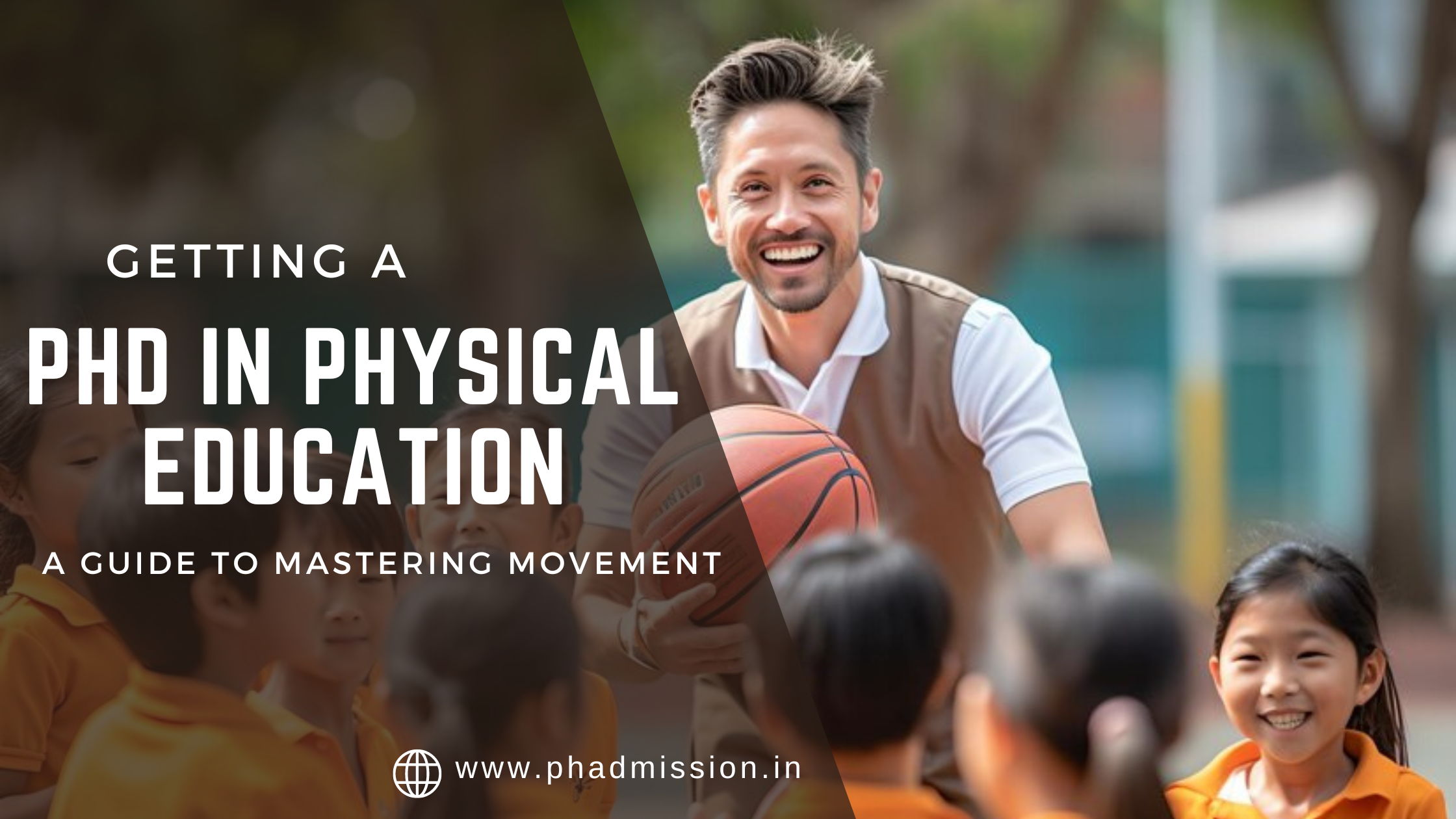Getting a PhD in Physical Education: A Guide to Mastering Movement
In this modern world, if you’re considering pursuing a PhD in Physical Education (PE), then you need to know a lot about role, requirement, career prospects in Phd in Physical education. Physical education is the study of anatomy, physiology, exercise science and nutrition. Physical educators also help students prepare for school by teaching them about safety, nutrition, health and wellness. Let’s dig deeper to understand more about PhD in Physical Education.
Table of Content
What is Physical Education?
The field of physical education is the study of human movement which can be used to promote fitness, health and well-being. Physical educators are concerned with how children develop valuable skills and movement patterns, how adults can use movement to improve their quality of life, how people learn to move more efficiently in order to accomplish tasks or develop specific skills, and how people can benefit from regular exercise programs.
They may help students with disabilities to learn to negotiate the physical environment safely so that they can participate fully in activities without any additional assistance. Also, physical educators work with teachers to ensure that all students are provided with quality instruction that meets their needs as learners. The goals of this field include improving academic achievement, enhancing student’s self-esteem, promoting positive body image, helping students become active participants in their communities, promoting physical fitness through fun activities that develop coordination and balance, enhancing the ability to manage stress, developing the ability to cope with illness or disability through appropriate intervention strategies supported by research evidence for increasing knowledge about nutrition and physical activity.
Getting your PhD in physical education ? What Roles are offered?
- A PhD in Physical Education will allow you to work as a researcher in academics, at medical institutions, and for private companies.
The roles offered by this course include:
- Research Assistant – Research Assistants help researchers with their studies by performing administrative tasks such as archiving data or collating research reports. This role can be very important for students who want to get into academics because it allows them to gain practical experience before starting their own research projects.
- Teacher – Teachers are those who teach lessons in schools, universities and other learning institutions around the world. They need to have relevant qualifications such as a master’s degree or higher before they can teach at this level.
- Project Leader – Project Leaders oversee projects undertaken by others within their organisation or institution and ensure that they are completed successfully within specified timelines. They also ensure that all related paperwork has been completed correctly before handing over responsibility to other people and students.
- Head Coach: A head coach is responsible for overall management of a team or group of players or coaches. They manage the team’s schedule and prepare them for matches and competitions. They also organise training sessions that improve players’ skills.
- Team Leader: Team leaders lead teams in various competitions, like sports tournaments or trials, as well as camps and camps for children. They ensure that their teams meet the required standards before they enter these competitions.
- Trainer: Trainers monitor players’ performance during matches and train them on how to perform better during these games. They also help players develop their skills so that they can become better athletes in future.
Why earn a PhD in Physical Education?

There are many reasons why people choose to earn a PhD in Physical Education. Those who are interested in pursuing a career in physical education can look into earning their PhDs. While it is not necessary to obtain a PhD to practice as a physical educator, it can help increase your knowledge and understanding of the field.
If you are considering earning a PhD in Physical Education, you may be wondering what it takes to complete one. There are several different types of PhD programs that exist throughout the country, each with its own specific requirements and coursework.
What are the requirements for a PhD in Physical Education?
PhD in Physical Education is a postgraduate course of study that provides the student with advanced knowledge and skills to prepare them for careers in teaching, research, or administration.
While earning a PhD in Physical Education, you will be able to explore different topics related to your field of interest such as human movement, physical education and health, biomechanics, exercise physiology and sport psychology. The course also aims at developing critical thinking skills and promoting lifelong learning.
There are various career options available after completing a PhD in Physical Education. You can choose to pursue postdoctoral studies or go for a job in academia or industry.
How much time does it take for a PhD in PE:
It typically takes three to five years to get your PhD in this field. You must complete coursework, pass comprehensive exams and define, write and defend your dissertation topic. On average, you should expect to spend two years in coursework alone.
What Skills are required for a PhD in Physical Education (P.E)?
Skills required for a PhD in Physical Education (P.E):
The skills required for a PhD in P.E range from specific knowledge and competence of a topic, to the ability to design, conduct and analyse research. These skills are essential to ensure that the practitioner is able to contribute effectively to their profession. The following are some of the skills that are required:
Knowledge: Knowledge of your discipline and its related areas is essential for any teacher or researcher working in physical education. For example, if you want to teach about movement and physical activity, then you need knowledge about motor control, biomechanics and exercise science. You also need an understanding of how these areas relate to each other.
Competence: You will need a good level of competence in order to do your job effectively. This means that you need to be able to identify what is happening within your subject area(s). It also means that you need the ability to critically evaluate evidence on which decisions are made in your field.
Creativity: Creativity enables us all as teachers or researchers to come up with innovative ideas which can lead our students onto new pathways towards health and wellbeing. It also allows us as scientists or clinicians to investigate new ways of treating patients with illness or injury.
Your PhD program may include coursework in pedagogy or behaviour analysis (to help you understand how people learn), research methods and statistics (to help you analyse data), biomechanics (to help you design safe fitness programs), motor learning (to help you design safe fitness programs) and more.

Summing Up
PhD in Physical Education is a life-changing decision. You will have a chance to go from being an educator to being a researcher and even more importantly, you’ll be able to help shape the future of physical education.

